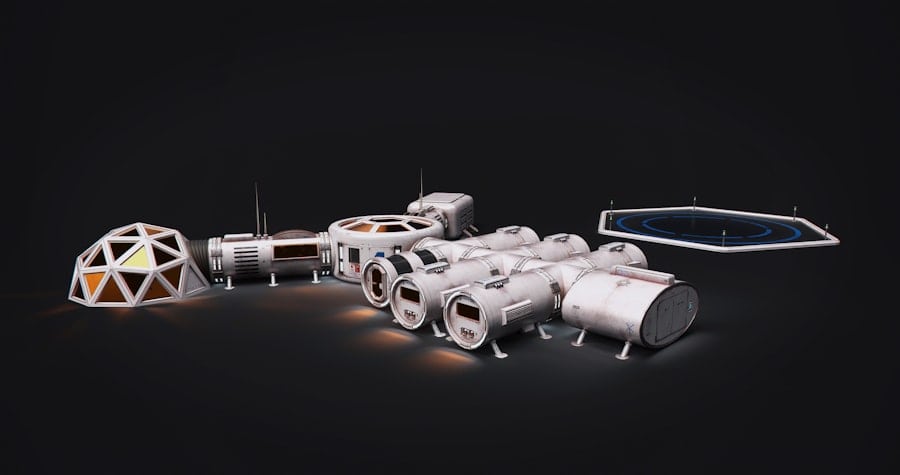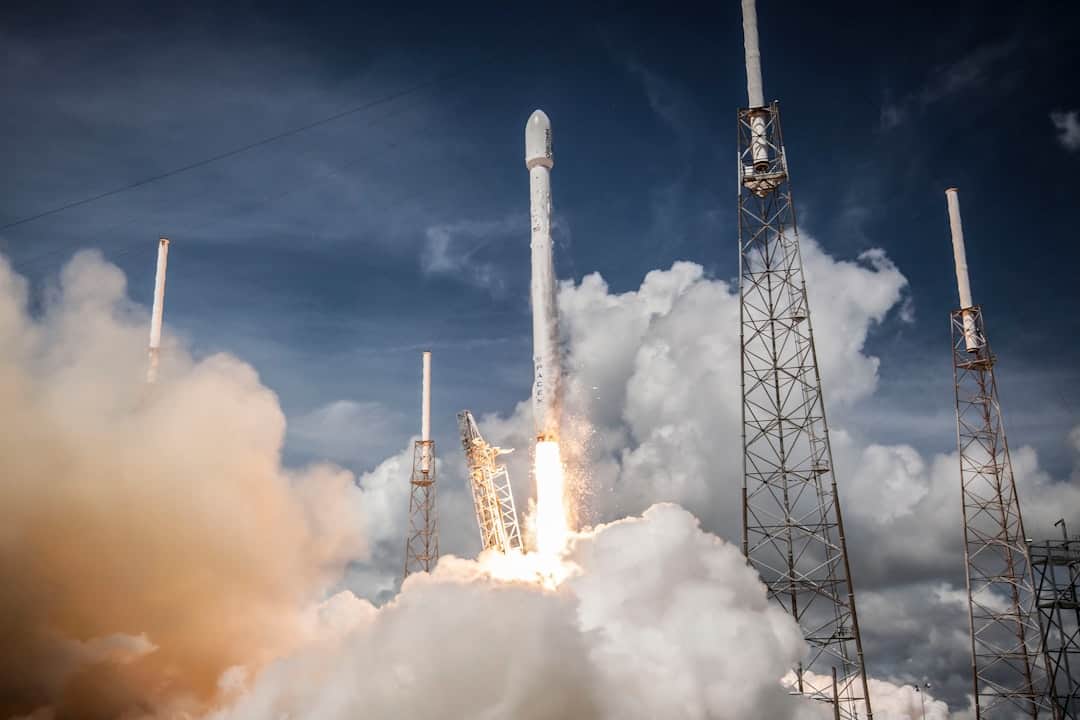The advent of artificial intelligence (AI) has revolutionized numerous sectors, and space exploration is no exception. As missions become increasingly complex and ambitious, the need for sophisticated logistical support has never been more critical. AI technologies are being integrated into various aspects of space mission logistics, enhancing efficiency, accuracy, and decision-making processes.
From planning and scheduling to predictive maintenance and supply chain management, AI is transforming how space agencies and private companies approach their missions.
The integration of AI into space logistics is not merely a trend; it represents a paradigm shift in how missions are conceived and executed.
Traditional methods often relied on manual processes that were time-consuming and prone to human error. In contrast, AI systems can process information at unprecedented speeds, enabling mission planners to simulate various scenarios and outcomes. This capability is particularly vital in an environment where every second counts, and the stakes are incredibly high.
As we delve deeper into the various applications of AI in space mission logistics, it becomes evident that this technology is not just an enhancement but a necessity for future explorations.
Key Takeaways
- AI plays a crucial role in optimizing logistics for space missions, improving efficiency and reducing risks.
- AI is used in planning and scheduling space missions, helping to optimize resource allocation and mission timelines.
- AI is essential for predictive maintenance and fault detection for spacecraft, ensuring the safety and reliability of missions.
- AI contributes to supply chain management for space missions, enabling better inventory management and resource allocation.
- AI is integrated into autonomous navigation and guidance systems for spacecraft, improving precision and reducing human error.
The Use of AI in Planning and Scheduling Space Missions
Optimizing Mission Processes
AI algorithms can analyze historical data, current mission parameters, and even real-time environmental conditions to optimize these processes. For instance, machine learning models can predict the best launch windows by evaluating factors such as weather patterns, orbital mechanics, and spacecraft readiness.
Informed Decision-Making
This predictive capability allows mission planners to make informed decisions that maximize the chances of success while minimizing risks. Moreover, AI can facilitate dynamic scheduling, which is crucial for missions that may encounter unexpected challenges or changes in circumstances.
Adaptability in Space Missions
For example, if a spacecraft experiences a delay due to technical issues or adverse weather conditions, AI systems can quickly recalibrate the mission timeline and resource allocation. This adaptability is essential in space missions where delays can have cascading effects on subsequent operations. By employing AI-driven planning tools, agencies can ensure that their missions remain on track even in the face of uncertainty.
AI’s Role in Predictive Maintenance and Fault Detection for Spacecraft

The reliability of spacecraft is paramount, as any malfunction can jeopardize the entire mission. Predictive maintenance powered by AI is emerging as a game-changer in this regard. By utilizing machine learning algorithms to analyze data from various sensors onboard the spacecraft, engineers can identify potential issues before they escalate into critical failures.
For instance, vibration analysis and thermal imaging can be processed by AI systems to detect anomalies that may indicate wear or malfunction in components such as engines or power systems.
By examining past incidents and their root causes, AI models can refine their algorithms to improve accuracy over time.
This proactive approach not only extends the lifespan of spacecraft but also reduces maintenance costs and downtime. In missions where every moment counts, such as those involving human crews or time-sensitive scientific experiments, the ability to foresee and mitigate potential issues is invaluable.
AI’s Contribution to Supply Chain Management for Space Missions
Supply chain management in space missions involves coordinating a myriad of components, from raw materials to finished spacecraft parts. The complexity of this process is amplified by the need for precision and reliability. AI technologies are increasingly being employed to streamline supply chain operations, ensuring that all necessary components are available when needed without incurring excessive costs or delays.
For example, AI algorithms can analyze supplier performance data to identify the most reliable vendors for specific components, thereby optimizing procurement strategies. Additionally, AI can enhance inventory management by predicting demand for various parts based on mission timelines and historical usage patterns. This predictive capability allows agencies to maintain optimal stock levels, reducing the risk of shortages or overstocking.
In a field where delays can lead to significant financial losses and missed opportunities, the efficiency brought about by AI-driven supply chain management is crucial. By automating routine tasks and providing insights into complex logistical challenges, AI enables teams to focus on higher-level strategic planning.
The Integration of AI in Autonomous Navigation and Guidance Systems for Spacecraft
As space missions venture further into uncharted territories, the need for autonomous navigation systems becomes increasingly apparent. AI plays a pivotal role in enabling spacecraft to navigate complex environments without direct human intervention. Advanced algorithms can process data from onboard sensors—such as cameras, LIDAR, and radar—to create real-time maps of the surrounding environment.
This capability is essential for landing on celestial bodies with uneven terrain or navigating through asteroid fields. Moreover, AI-driven guidance systems can adapt to changing conditions during flight. For instance, if a spacecraft encounters unexpected obstacles or variations in gravitational forces, AI algorithms can recalibrate its trajectory in real-time.
This level of adaptability not only enhances safety but also increases mission efficiency by allowing spacecraft to take optimal paths that may not have been pre-planned. The integration of AI into navigation systems represents a significant leap forward in our ability to explore distant worlds autonomously.
AI’s Impact on Data Analysis and Decision Making in Space Mission Logistics

Unlocking Insights with Machine Learning
Machine learning algorithms can identify patterns and correlations within the data that may not be immediately apparent to human analysts. For example, during a planetary exploration mission, AI can sift through thousands of images captured by onboard cameras to identify geological features or signs of past water activity. This capability not only accelerates the analysis process but also enhances the quality of insights derived from the data.
Real-Time Decision Support
Furthermore, AI can assist decision-makers by providing recommendations based on real-time data analysis, allowing for more informed choices regarding mission adjustments or scientific priorities.
Enhancing Mission Success with AI
By leveraging AI technologies, space agencies can overcome the limitations of traditional data processing methods and unlock the full potential of their data. With faster and more accurate analysis, missions can be more efficient, and scientists can gain a deeper understanding of the universe.
AI’s Role in Enhancing Communication and Coordination for Space Missions
Effective communication and coordination among various teams involved in a space mission are essential for its success. The complexity of modern missions often requires collaboration across multiple disciplines and organizations, making seamless communication vital. AI technologies can facilitate this process by automating routine communications and providing centralized platforms for information sharing.
For instance, chatbots powered by natural language processing can handle common inquiries from team members, freeing up human resources for more complex tasks. Additionally, AI can enhance coordination by analyzing workflows and identifying bottlenecks in communication channels. By providing insights into team dynamics and information flow, AI systems can recommend strategies for improving collaboration among different teams—whether they are focused on engineering, science, or logistics.
This holistic approach ensures that all stakeholders are aligned and informed throughout the mission lifecycle.
The Future of AI in Space Mission Logistics and Potential Challenges
As we look toward the future of space exploration, the role of AI in mission logistics is poised to expand significantly. With advancements in machine learning, natural language processing, and robotics, we can expect even greater integration of AI technologies into all facets of space missions. However, this evolution does not come without challenges.
One major concern is the reliability of AI systems; as they become more autonomous, ensuring their accuracy and robustness becomes paramount. Moreover, ethical considerations surrounding the use of AI in decision-making processes must be addressed. As machines take on more responsibilities traditionally held by humans, questions arise about accountability and transparency in decision-making frameworks.
Ensuring that human oversight remains integral while leveraging the benefits of AI will be crucial as we navigate this new frontier. In conclusion, while the potential for AI to transform space mission logistics is immense, careful consideration must be given to its implementation and oversight. As we continue to push the boundaries of exploration beyond our planet, harnessing the power of artificial intelligence will be essential for achieving our ambitious goals while addressing the inherent challenges that come with such groundbreaking endeavors.
In a recent article on ENICOMP, the early bird price for the Mobility 2021 conference has been extended for one more day. This event will likely cover cutting-edge technologies, including the role of AI in automating space mission logistics. To stay updated on the latest technology news and reviews, be sure to check out ENICOMP’s original home for technology news and reviews. Additionally, if you’re interested in the best Apple tablets for 2023, ENICOMP has you covered with their latest article. Stay informed and ahead of the curve with ENICOMP’s insightful content. Click here to read more.
FAQs
What is AI?
AI, or artificial intelligence, refers to the simulation of human intelligence in machines that are programmed to think and act like humans. This includes tasks such as learning, problem-solving, and decision-making.
How is AI used in space mission logistics?
AI is used in space mission logistics to automate and optimize various tasks such as scheduling, resource allocation, route planning, and decision-making. This helps in streamlining the logistics of space missions and improving overall efficiency.
What are the benefits of using AI in space mission logistics?
Using AI in space mission logistics can lead to improved accuracy, faster decision-making, reduced human error, and overall cost savings. It can also help in handling complex and dynamic environments that are common in space missions.
What are some examples of AI applications in space mission logistics?
Some examples of AI applications in space mission logistics include autonomous navigation systems, predictive maintenance for spacecraft, intelligent scheduling and resource allocation, and automated data analysis for mission planning.
Are there any challenges in using AI for space mission logistics?
Challenges in using AI for space mission logistics include the need for robust and reliable AI algorithms, potential cybersecurity risks, and the ethical considerations of autonomous decision-making in space missions. Additionally, there may be limitations in the availability of data for training AI models in space environments.

